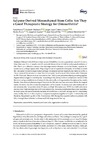Identificador persistente para citar o vincular este elemento:
https://accedacris.ulpgc.es/jspui/handle/10553/42210
| Título: | Adipose-derived mesenchymal stem cells: Are they a good therapeutic strategy for osteoarthritis? | Autores/as: | Damia, Elena Chicharro, Deborah Lopez, Sergio Cuervo, Belen Rubio, Monica Sopena, Joaquin J. Vilar, José Manuel Carrillo, Jose Maria |
Clasificación UNESCO: | 32 Ciencias médicas | Palabras clave: | Osteoarthritis Mesenchymal stem cells Regenerative medicine |
Fecha de publicación: | 2018 | Editor/a: | 1422-0067 | Publicación seriada: | International Journal of Molecular Sciences | Resumen: | Osteoarthritis (OA) is a major cause of disability in elderly population around the world. More than one-third of people over 65 years old shows either clinical or radiological evidence of OA. There is no effective treatment for this degenerative disease, due to the limited capacity for spontaneous cartilage regeneration. Regarding the use of regenerative therapies, it has been reported that one option to restore degenerated cartilage are adipose-derived mesenchymal stem cells (ASCs). The purpose of this review is to describe and compare the efficacy of ASCs versus other therapies in OA. Methods: Recent studies have shown that ASCs exert paracrine effects protecting against degenerative changes in chondrocytes. According to the above, we have carried out a review of the literature using a combination of osteoarthritis, stem cells, and regenerative therapies as keywords. Results: Conventional pharmacological therapies for OA treatment are considered before the surgical option, however, they do not stop the progression of the disease. Moreover, total joint replacement is not recommended for patients under 55 years, and high tibia osteotomy (HTO) is a viable solution to address lower limb malalignment with concomitant OA, but some complications have been described. In recent years, the use of mesenchymal stem cells (MSCs) as a treatment strategy for OA is increasing considerably, thanks to their capacity to improve symptoms together with joint functionality and, therefore, the patients' quality of life. Conclusions: ASC therapy has a positive effect on patients with OA, although there is limited evidence and little long-term follow-up. | URI: | https://accedacris.ulpgc.es/handle/10553/42210 | ISSN: | 1422-0067 | DOI: | 10.3390/ijms19071926 | Fuente: | International Journal of Molecular Sciences [ISSN 1422-0067], v. 19 (7) |
| Colección: | Reseña |
Citas SCOPUSTM
63
actualizado el 08-jun-2025
Citas de WEB OF SCIENCETM
Citations
58
actualizado el 08-feb-2026
Visitas
262
actualizado el 15-ene-2026
Descargas
129
actualizado el 15-ene-2026
Google ScholarTM
Verifica
Altmetric
Comparte
Exporta metadatos
Los elementos en ULPGC accedaCRIS están protegidos por derechos de autor con todos los derechos reservados, a menos que se indique lo contrario.
